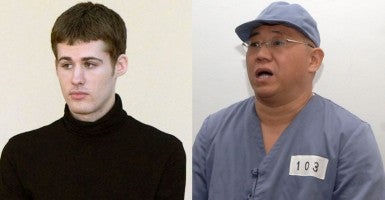North Korea unexpectedly released the final two American citizens it had been holding on trumped-up charges of espionage.
Kenneth Bae and Matthew Miller were freed Saturday following a secret mission by Director of National Intelligence James Clapper to Pyongyang.
North Korea’s gesture follows its recent release of Jeffrey Fowle, who had been arrested and held since May for leaving a Bible in a nightclub. At the time of Fowle’s release, Secretary of State John Kerry denied the United States had struck any deal, declaring that “there was no quid pro quo.”
Washington’s dispatching Clapper to Pyongyang as a senior envoy, however, will resurrect suspicions of secret negotiations to gain Bae and Miller’s release.
Miller, a 20-year-old American tourist, was sentenced to six years of hard labor for “attempted espionage.” Miller ripped up his tourist visa and declared he wanted asylum, but Pyongyang accused him of intending to “experience prison life so that he could investigate the human rights situation” in North Korea.
Kenneth Bae, a Christian missionary, was sentenced in 2013 to 15 years of hard labor for “hostile acts against the republic.”
Pyongyang previously released Americans after they publicly confessed to their “crimes” and expressed remorse. In September, Pyongyang allowed CNN to film highly choreographed “confessions” by the three detainees and their appeals to Washington to send a senior-level envoy to secure their release.
Clapper seems an unlikely envoy but North Korea has a long history of secretly meeting with South Korean intelligence officials.
Syd Seiler, a CIA veteran who was recently designated as the U.S. envoy on the North Korean nuclear issue, has reportedly made several secret trips to North Korea. Washington and Pyongyang may have felt Clapper was more likely to be able to travel to North Korea more clandestinely than more visible U.S. officials. It is not known whether Clapper negotiated an agreement or whether it had been worked out prior to his arrival.
Pyongyang most likely released the three Americans to defuse growing international condemnation of its human rights abuses.
In February, a U.N. Commission of Inquiry accused Pyongyang of human rights violations so egregious and widespread as to qualify as crimes against humanity. The commission report galvanized international resolve to act, including a pending U.N. resolution to refer North Korea and leader Kim Jong-un to the International Criminal Court.
The unprecedented and long-overdue international effort to confront North Korea on its human rights abuses startled the regime and led to frantic attempts to derail the process.
For the first time in 15 years, the North Korean foreign minister attended the U.N. General Assembly meeting, during which he defended the regime’s human rights record. Pyongyang accused the United States of politicizing the human rights issue in an attempt to “cause internal instability” and “seek regime change.”
Human rights and enforcing U.S. laws against North Korean illicit activities often took a back seat to resolving the North Korean nuclear issue. Pyongyang’s anxious response to the U.N. Commission of Inquiry report shows human rights should be an integral part of a comprehensive American and international approach toward North Korea.





























